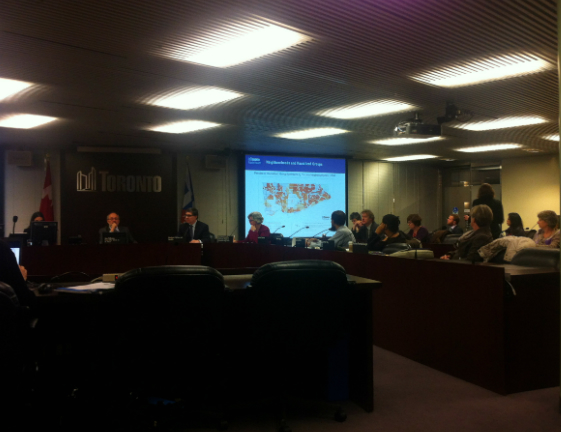

Toronto’s Board of Health recommends mental health research for racialized communities
Archive 2013 Nov 5, 2013 Deanna Grant

The City of Toronto’s Board of Health approved a motion to research mental health in racialized communities.
Councillor Sarah Doucette’s motion to request the Medical Officer of Health work with city agencies to report on a strategy to address mental health needs in communities experiencing high rates of violence, supported by Councillor Adam Vaughan was passed yesterday.
Vaughan says there needs to be a motion for mental health in racialized areas. “These are high trauma areas and there is no data.”
Fear, depression, and PTSD are not tracked as a civilian reality says Vaughan. For the people experiencing the trauma, it is catastrophic and it leads to more violence.
Vaughan suggests a program where health care providers are trained to deal with mental health. Vaughan says the program will cost a fraction of hiring mental health professionals and need to be deployed as soon as possible.
Chair of the meeting, Joe Mihevc relates to a study conducted by Dr. David McKeown which shows that racialized groups lack access to proper health care.
Mihevc says Toronto is a diverse community and is affected by racism which causes stress and health problems. The study includes a map of the city where health care is lacking which Mihevc says coincidentally matches up to where racialized people are living.
While racialized people do have access to public health care, there are aspects of health care that they often do not have access to, like the dentist. Statistics from the Wellesley Institute show that you are 45 per cent more likely to be working for minimum wage if you are racialized. A minimum-wage-income often cannot provide the money needed to pay for a teeth cleaning or eye check-up.
The study arrives at the conclusion that racial discrimination is associated with poor health outcomes.
“This report is the foundation and justification for this motion. And if this is not moving forward I am not going to another funeral without crying,” Vaughan says.
Director of Doctors Without Borders Canada, Chris Houston says “people ought to be involved in their health system.”
After reading a tweet endorsing the meeting from one of his students at the University of Toronto, Houston decided to attend. Houston, along with about 25 others gathered to listen to the issues facing Toronto’s health sector.







